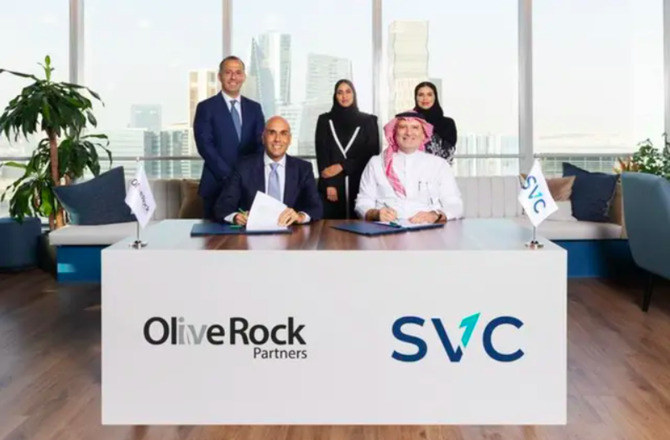CAIRO: Startups across the Middle East and North Africa experienced a surge in funding, bucking the trend of the typically slower business pace during the holy month.
Contrary to expectations, the region’s venture landscape saw an impressive array of deals, indicating robust activity and investor confidence across various sectors in the first week of Ramadan.
The Kingdom’s government investment vehicle Saudi Venture Capital Co. announced a $30 million investment in Olive Rock Partners Fund I.
The investment aligns with SVC’s strategy to develop and sustain financing for startups and small and medium-sized enterprises in strategic sectors.
Focused on mid-market buyouts that are demographically driven, geographically advantaged, and technologically enabled, Olive Rock Partners Fund I is a regional private equity fund aiming to boost the ecosystem.
The agreement was signed by Nabeel Koshak, CEO and board member of SVC, and Muhannad Qubbaj, founding partner of Olive Rock Partners, in the presence of key officials from both organizations.
“The investment in Olive Rock Partners Fund I is part of SVC’s Investment in Funds Program, which is a continuation of the company’s series of investments and an implementation of its strategy related to developing and sustaining financing for startups and SMEs, especially in strategic sectors,” Koshak said.
Qubbaj expressed gratitude for SVC’s trust and highlighted the partnership’s potential to fuel growth in the SME space and enhance the direct investment landscape in Saudi Arabia.
Established in 2018 as a subsidiary of the SME Bank, part of the National Development Fund, SVC is committed to stimulating and sustaining financing for startups and SMEs from pre-seed to pre-initial public offering stages through investments in funds and direct investments in startups and SMEs.
Mitgo Group acquires UAE’s Embedded
Mitgo Group, a Germany-based marketing technology provider, has expanded its portfolio by acquiring UAE-based Embedded, a finance platform.
Established in 2022 by Alexander Bachmann, Mitgo Group aims to enhance its service offerings in the affiliate market with this acquisition.
Embedded, founded in 2023 by Oleg Chanchikov, specializes in integrating financial services within other businesses, aligning well with Mitgo’s strategic direction.
The acquisition enables Mitgo Group to diversify its solutions, providing clients with innovative financial services embedded directly into their platforms.
This move is expected to strengthen Mitgo’s position in the market, offering more comprehensive services to its customers in the affiliate marketing sector.
UAE’s traveltech Seeru raises pre-seed round
UAE-based traveltech startup Seeru has successfully raised a pre-seed funding round led by US-based venture studio Nabtah Ventures.
Co-founders Abd Elmohaimen Mansi and Abdullah Mancy launched Seeru to streamline the travel planning process for various stakeholders, including individual travelers and agencies.
The platform aims to eliminate the complexities associated with organizing trips, offering a comprehensive solution to enhance the travel experience.
With the injection of fresh capital, Seeru is poised to accelerate its product development efforts and broaden its reach in the global market.
Kuwait’s Mojo raises seven-figure seed round
Kuwait-based social commerce platform Mojo has secured a seven-figure seed investment led by Joa Capital and Emkan Capital, with additional support from Plus VC, Atyab Al Marshoud, Wahed Invest, and other angel investors.
Founded in 2022 by Abdulaziz Al-Bahar and Nadia Al-Hamad, Mojo provides a platform where users can explore, review, and recommend beauty, skincare, and wellness products.
The funding will be instrumental in enhancing Mojo’s technology stack, attracting top-tier talent, and expanding its market presence, particularly in Saudi Arabia.
Saudi-based Grintafy receives investment from Chiliz
Saudi Arabia-based sportstech Grintafy has received an investment from Chiliz, bolstering its position as a leading football talent discovery platform.
Founded in 2019 by Majdi Allulu, Grintafy connects aspiring footballers with professional opportunities, leveraging technology to scout and showcase talent across the Middle East and Europe.
The partnership with Chiliz will enable Grintafy to accelerate its adoption of web3 technologies and expand its reach in the international sports arena.
Chiliz, known for its expertise in blockchain and sports engagement, will provide Grintafy with the technological infrastructure and ecosystem support to enhance its offerings and drive growth.
Grintafy’s collaboration with Chiliz marks a significant step forward in its mission to revolutionize football talent discovery.
By integrating cutting-edge technology and expanding its global footprint, Grintafy is poised to unlock new opportunities for players and clubs alike, contributing to the development of the sport on a global scale.
Egypt’s 30Med secures pre-seed round
Egypt-based business to business healthtech 30Med has raised pre-seed funding from anonymous angel investors, marking a key milestone in its mission to connect pharmaceutical companies with medical professionals.
Founded in 2023 by Ayman Ragab, 30Med offers an innovative platform that facilitates the exchange of knowledge and information about new medicines through interactive videos and events.
The investment will enable 30Med to enhance its platform, expanding its reach within the medical community and further bridging the gap between pharmaceutical firms and healthcare providers.
Morocco’s ORA Technologies secures $1.5m in a seed round
ORA Technologies, based in Morocco, has secured $1.5 million in seed funding to drive the growth of its superapp.
Founded in 2023 by Omar Alami, ORA integrates various features, including peer-to-peer transactions, e-commerce, and social networking, into a single platform.
ORA also secured a partnership with M2T, a subsidiary of Banque Centrale Populaire, which paves the way for the imminent launch of ORA’s digital wallet.
The funding will accelerate ORA’s expansion plans, enhancing its suite of services and expanding its user base.

























